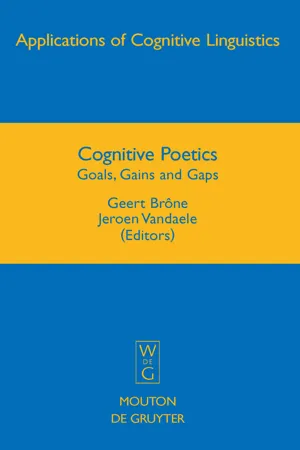
Cognitive Poetics
Goals, Gains and Gaps
- 567 pages
- English
- PDF
- Available on iOS & Android
About this book
For more than two decades now, cognitive science has been making overtures to literature and literary studies. Only recently, however, cognitive linguistics and poetics seem to be moving towards a more serious and reciprocal type of interdisciplinarity. In coupling cognitive linguistics and poetics, cognitive poeticians aim to offer cognitive readings of literary texts and formulate specific hypotheses concerning the relationship between aesthetic meaning effects and patterns in the cognitive construal and processing of literary texts. One of the basic assumptions of the endeavour is that some of the key topics in poetics (such as the construction of text worlds, characterization, narrative perspective, distancing discourse, etc.) may be fruitfully approached by applying cognitive linguistic concepts and insights (such as embodied cognition, metaphor, mental spaces, iconicity, construction grammar, figure/ground alignment, etc.), in an attempt to support, enrich or adjust 'traditional' poetic analysis. Conversely, the tradition of poetics may support, frame or call into question insights form cognitive linguistics.
In order to capture the goals, gains and gaps of this rapidly growing interdisciplinary field of research, this volume brings together some of the key players and critics of cognitive poetics. The eleven chapters are grouped into four major sections, each dealing with central concerns of the field: (i) the cognitive mechanisms, discursive means and mental products related to narrativity (Semino, Herman, Culpeper); (ii) the different incarnations of the concept of figure in cognitive poetics (Freeman, Steen, Tsur); (iii) the procedures that are meant to express or create discursive attitudes, like humour, irony or distance in general (Antonopoulou and Nikiforidou, Dancygier and Vandelanotte, Giora et al.); and (iv) a critical assessment of the current state of affairs in cognitive poetics, and more specifically the incorporation of insights from cognitive linguistics as only one of the contributing fields in the interdisciplinary conglomerate of cognitive science (Louwerse and Van Peer, Sternberg). The ensuing dialogue between cognitive and literary partners, as well as between advocates and opponents, is promoted through the use of short response articles included after ten chapters of the volume.
Geert Brône, Katholieke Universiteit Leuven, Belgium; Jeroen Vandaele, University of Oslo, Norway.
Frequently asked questions
- Essential is ideal for learners and professionals who enjoy exploring a wide range of subjects. Access the Essential Library with 800,000+ trusted titles and best-sellers across business, personal growth, and the humanities. Includes unlimited reading time and Standard Read Aloud voice.
- Complete: Perfect for advanced learners and researchers needing full, unrestricted access. Unlock 1.4M+ books across hundreds of subjects, including academic and specialized titles. The Complete Plan also includes advanced features like Premium Read Aloud and Research Assistant.
Please note we cannot support devices running on iOS 13 and Android 7 or earlier. Learn more about using the app.
Information
Table of contents
- Frontmatter
- Table of contents
- Cognitive poetics. A critical introduction
- Text worlds
- Cognitive approaches to narrative analysis
- Reflections on a cognitive stylistic approach to characterisation
- Minding: feeling, form, and meaning in the creation of poetic iconicity
- Metaphor and figure-ground relationship: comparisons from poetry, music, and the visual arts
- Deconstructing verbal humour with Construction Grammar
- Judging distances: mental spaces, distance, and viewpoint in literary discourse
- Does an “ironic situation” favor an ironic interpretation?
- How cognitive is cognitive poetics? The interaction between symbolic and embodied cognition
- Epilogue. How (not) to advance toward the narrative mind
- Backmatter